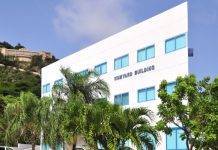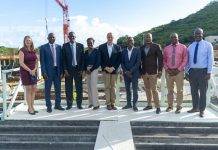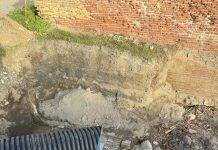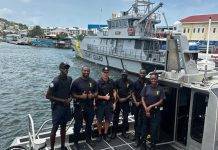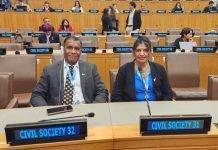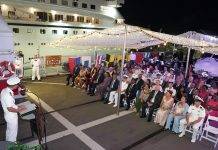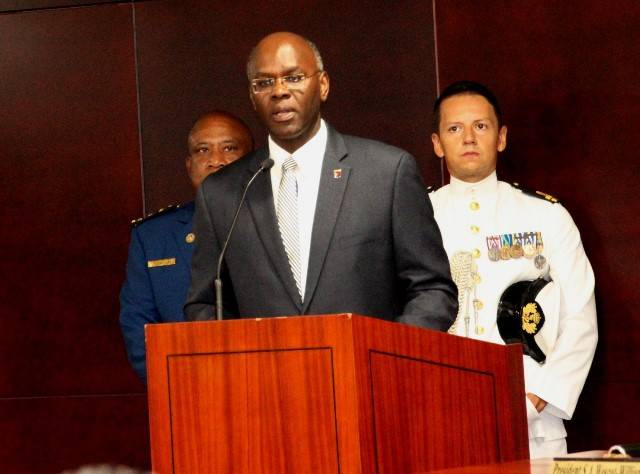BY THE GOVERNOR OF SINT MAARTEN
HIS EXCELLENCY DRS. EUGENE B. HOLIDAY
TUESDAY, SEPTEMBER 11, 2018
Madame Chairlady, Members of Parliament,
Today September 11th, 2018, we gather here in fulfillment of our constitutional mandate to mark the start of a new parliamentary year. A mandate which, amidst significant socio-economic and environmental challenges, offers a national moment to come together to reflect on our common interests and aspirations. It is in that context that I, in my capacity as Governor of Sint Maarten, present you and thus the people of our country with an outline of the policy plans of the government for the coming year.
Over the past year our people have experienced and continue to experience though times. In the wake of the devastating impact of hurricanes Irma and Maria, our people have exhibited strength and resilience. This by picking up their lives, rebuilding their homes and their businesses, and by going to the polls to elect this new parliament. And in doing so, investing in their future, in Sint Maarten’s future. We have as a result come a long way. This with the help and support of our Kingdom partners and international organizations. But there is still a long way to go to rebuild a more sustainable Sint Maarten.
Madame Chairlady, Members of Parliament,
The impact and effects of the devastation of Hurricanes Irma and Maria, estimated in terms of damages and losses at 2.7 billion US dollars, will be felt for a long time to come. No sectors were spared. Our private and public infrastructure were severely damaged: our homes, businesses, hotels, airport, seaport, utilities and government infrastructure were affected resulting in a loss in economic activity, business revenues, taxes and employment.
In 2017 GDP contracted by 4.8 percent and it is expected to contract further in 2018. With tourism being the main pillar of our economy, the extent of the loss of economic activity is, among others, reflected in the decline in stay-over visitors by some 75 percent and in cruise visitors by some 33 percent during the first half of 2018 compared to the same period in 2017. This economic fallout has left many businesses cash strapped and people without work or on reduced work hours and pay. Similarly, government revenues have declined resulting in budget deficits of 72.4 million NA guilders in 2017 and 197 million NA guilders in 2018.
Government recognizes that this reality has created major challenges but believes that it has also brought with it new opportunities for growth and general improvements. Looking ahead, Government through its governing program for the years 2018 – 2022, “Building a Sustainable Sint Maarten” is focused on securing a prosperous and safe nation for all. To achieve that government is committed to pursuing a combination of five strategic objectives. These are:
- One, Setting it right, to put Sint Maarten back on track;
- Two, Revive and restore, to rebuild with an emphasis on sustainability;
- Three, Restructuring government, to improve efficiency and provide better public service;
- Four, Safety and security, to upgrade public protection and national security; and
- Five, Health and social wellbeing, to promote health and well-being in our own lives.
Within these five strategic objectives government has identified some 25 key priorities.
To support its pursuit of these strategic objectives and related key priorities, Government has in collaboration with the World Bank, completed its National Recovery and Resilience Plan, the NRRP. This plan is to serve as government’s roadmap for the recovery process in the coming years. With parliament having recently approved the NRRP, Government is poised to move forward with the implementation of its recovery plans.
It is estimated that 2.3 billion US dollars, not including the budget and liquidity deficits, will be needed to rebuild our infrastructure and economy for recovery and resilience over the next seven years. The Dutch Government has for that purpose made some 580 million US dollars available through the reconstruction and resilience Trust Fund at the World Bank. Additionally, some 497 million US dollars is expected to come from insurance payouts. That leaves a financing gap of over 1 billion US dollars and poses a serious challenge going forward.
Madame Chairlady, Members of Parliament,
Looking ahead, government has therefore, given its limited financial resources, decided to focus on addressing the immediate needs of our people: housing, employment, health care, and safety and security. It is in this context that government has, together with the World Bank, been working intensively on the preparation and early implementation of the first projects that will be financed by the Trust Fund. A first set of activities focuses on restoring first responder’s full operational capacity and on the emergency repair of critical public buildings, shelters, and housing. This includes the repair of police stations, of the fire station and schools, a large-scale roof repair program for homes of vulnerable groups, urgent assistance to the Sint Maarten Housing Development Foundation to repair social and affordable housing and the acquisition of urgently needed fire trucks, ambulances and emergency equipment.
The Government and the World Bank are also starting projects on (1) solid waste management and debris removal and (2) an emergency income support and training program targeting economically critical sectors. Together, these and other priority projects identified in the Governing Program, serve to address some of the most urgent needs of the people of Sint Maarten.
To achieve its objectives government will take steps to strengthen the government apparatus through capacity building and augmentation. One element in that regard is the establishment and manning of the National Recovery Program Bureau responsible for executing and managing the recovery and reconstruction process.
Government is currently in the process of recruiting personnel to man the program bureau. The program bureau will be financed through the Trust Fund and will assist the ministries with the necessary requirements of Trust Funds projects, including financial management, procurement, as well as social and environmental safeguards. Until the Bureau is fully operational, the implementation of the first projects that are financed through the Trust Fund, is coordinated by the Interim Recovery Committee, chaired by the Prime Minister.
Madame Chairlady, Members of Parliament,
With its focus on rebuilding and reconstruction and taking into account threats associated with climate change, government is dedicated to mitigating risks associated with disasters and thereby to enhancing the safety of our population.
Capacity building regarding disaster management is therefore a key priority of government. Government has as a result embarked on a review of our country’s disaster preparedness with an aim of updating existing disaster management plans. Government, among others, recognizes the need for a disaster management fund. It is therefore in the process of developing plans to realize such a fund. In the meantime, government has joined the Caribbean Cata-stro-phe Risk Insurance Facility, (CCRIF). The facility is designed to provide short-term liquidity if Sint Maarten is hit by a hurricane or other natural disaster.
Government is, in addition to capacity building, in the process of taking steps to realize a number of institutional building initiatives. These include:
- The introduction of the national ordinance regulating the integrity chamber; and
- The development of legislation for the introduction of a gaming control board.
Madame Chairlady, Members of Parliament,
Underpinning government’s capacity building and sustainability agenda is its position that “Resilience starts with Education”. Important education policy initiatives in that respect include:
- First, the creation of a policy document on “Building Safer, Resilient and Child-Friendly Schools for 21st Century Learning on St. Maarten, with the support of UNICEF Netherlands;
- Second, the allocation of funds from the preliminary insurance claim settlement for the execution of school repairs for both public and subsidized schools;
- Third, the ongoing implementation of the iSTEP project in all Public Schools, with the training of a group of 50 teachers and 25 school managers;
- Fourth, the decision of government to support the law program of the University of St. Martin (USM) in collaboration with the University of Curaçao; and
- Fifth, the ongoing discussions with regional educational institutions to offer students additional affordable study opportunities. This by expanding the list of Government’s preferred educational institutions.
During this parliamentary year government looks forward to your support on these education policies and, particularly where it concerns:
- The finalization of the draft Ordinance on Higher Education which, as part of the legislative process, has been shared with key stakeholders for their feedback; and
- The completion of the draft Study Finance Ordinance which is now before parliament for approval.
Madame Chairlady, Members of Parliament,
To successfully rebuild a sustainable Sint Maarten, government considers the health and social well-being of the population to be of paramount importance. This calls for a healthy economy, a healthy environment, a sense of security and a feeling of wellbeing. Government is therefore committed to building back social capital, to strengthen the social resources upon which people draw in pursuit of their livelihood. Essential programs in this regard include:
- One, the development of a social registry system to serve the community more effectively with a focus on poverty reduction and the eradication of inequality;
- Two, the sheltering and reintegration of those who were displaced;
- Three, the emergency income support & skills training;
- Four, taking preventative measures through vector control in the debris-cleaning program; and
- Five, improving the capacity, accessibility, quality and availability of health care services.
The realization of a new hospital is central to the improvement of healthcare on Sint Maarten. Government’s focus in the coming period will therefore be the construction of a new hospital. That while also increasing the number of available specialties and strengthening the old hospital until the new building becomes available. This will go hand in hand with a program to further improve the quality of care and patient safety at the Sint Maarten Medical Center (SMMC) through the Joint Commission International (JCI) accreditation. Furthermore, government will facilitate a comprehensive health care reform, which will introduce a basic health care package for all citizens, within this governing period. Additionally, the reform will target
- One, improved regulation & registration of all medical practitioners;
- Two, introduction of a Health Information Management System (HIMS) to improve communication between different care providers;
- Three, introduction of cost control measures for pharmaceuticals; and
- Four, improvements to the present medical referral system.
By addressing these matters government plans to realize a more sustainable solution for health care and the associated costs.
Additionally, government – as part of its health and wellness policies – is focusing on an active lifestyle through participation in sports. In that regard government will work on Institutional strengthening, including an improvement plan for sports facilities; quality standards for a sports curriculum and sports teachers; and an increased awareness about sports with an eye on further developing Nationalism in Sports.
On the other side of Government’s health and social well-being agenda is its care for the environment. Without a healthy living environment, Government’s health care agenda will be less effective. In terms of the care for the environment waste management on Sint Maarten is the main challenge. A first priority is to find a permanent solution to the dump fires, which threatens the health of our community. Furthermore, while a significant effort has been made to clean up the island after the hurricanes of 2017, there is still more to be done. More, in the area of neighborhood clean-up and the clean-up of the Simpson Bay Lagoon from boat-wrecks and debris. In view of this government intends:
- to improve the management of waste streams at the landfill;
- to introduce recycling, including the removal of metals and other recyclable material from the island; and
- to improve the general management of the landfill.
In its efforts to address the waste management challenges, government is working closely with the World Bank and the Netherlands and has been seeking cooperation with the counterparts to the north.
The care for the environment agenda also includes the expansion of the sewage treatment network to achieve island wide coverage. The sewage treatment plant at the A.T. Illidge Road was expanded in 2012 to cater to the entire eastern part of Sint Maarten. Government is preparing the 11th EDF, which entails the start of a sewage network for Cole Bay, simultaneously with the realization of a sewage treatment plant for the areas west of the Cole Bay Hill, in collaboration with the French Side.
A sustainable implementation of sewage projects will, given the precarious nature of the finances of the Country, require the implementation of sewage levies to financially support the management of the network. The Wastewater Ordinance, which was enacted in January 2009, includes the possibility to implement a sewage levy.
The environment and nature of the island plays a major role in the tourism economy of Sint Maarten. It is of paramount importance that we take measures to protect our environment and nature. It is the intention to establish an environment and nature policy for Sint Maarten, as a framework to guide all efforts in the area of environment and nature management, including protecting what is left of the bio-diversity on the island. This will include proposals to establish our first terrestrial nature park in Cul De Sac, in harmony with the Rainforest Adventure project, which was realized on the historical Emilio Wilson Estate.
Madame Chairlady, Members of Parliament,
An essential part of our living environment is the availability of adequate and affordable housing. This concern has been exacerbated by the hurricanes of 2017, which left many families homeless or with their homes severely damaged and uninhabitable. This issue is, among others, reflected in the increase in the housing waiting list at the Sint Maarten Housing and Development Foundation (SMHDF) from 1500 persons prior to Irma to more than 2500 post-Irma. Government therefore intends to work with the SMHDF on projects for the construction of new affordable housing in the locations of FOGA and Over-The-Bank. Government is also cooperating with APS for the housing project in Welgelegen.
To address substandard living conditions and provide the necessary help to those who need it most, government will research and establish a poverty line. This with the objective of determining who fall below this line and how to best contribute to improving their living conditions. Various policies focusing on social care, the elderly, domestic violence and sexual and reproductive health are in different stages of development and will be important additions to St. Maarten’s expanding social environment. This will include continued investigation and further revision of the current old age pension and widows and orphans’ legislation, in addition to reviewing and updating if necessary, the legislation on financial aid.
Together with its push for adequate and affordable housing government will introduce legislation to modernize the building code. This “build back better”-project is currently underway, with the support of the International arm of the Association of Dutch Municipalities.
Having better control on the spatial development of the country, is essential to successfully rebuild for sustainability. Government is working on completing the Spatial Development Strategy with the use of the Global Sustainable Development Goals which will result in zoning plans legislation. At the moment, plans for 2 areas have been brought into the legislative process and will soon be submitted to Parliament for handling. For several other areas, further public consultations will be held to finalize the preparation of the zoning plans.
In this regard, there is also a proposal being finalized, entailing the reform of the legislative framework of VROMI. This through the preparation of a new VROMI Ordinance, in the form of a framework-umbrella ordinance with a harmonized chapter in enforcement.
Madame Chairlady, Members of Parliament,
The impact of hurricanes Irma and Maria has resulted in significant labor market imbalances. Whereas jobs have been lost in various sectors in the economy, there has been a substantial increase in demand for labor in the construction sector. To address the challenges of the labor market imbalances, government’s medium- to longer-term objective is to build resilience, which will include:
- fostering employability in the labor force in key sectors;
- the establishment of an unemployment insurance fund, as a contingency instrument to cope with economic shocks; and
- streamlining the delivery of vital social services, centered on a community-based approach.
With respect to the challenges in the labor market, government will continue to work on the proposed revisions to the Civil Code, which is currently being discussed in Parliament. Changes will address the issue of short-term labor contracts, expand the provision of pregnancy and maternity leave, and alter conditions for transfer of enterprise.
Government will also continue with plans to establish a fully operational National Employment Service Center. The aim is to provide insight into the labor market, ensure that education is in line with labor needs and link job seekers and job providers in a ‘smart’ way. Jobseekers, especially youth, will see additional training support.
In addition, businesses are expected to encounter challenges in paying AOV (pension contributions) during the recovery. Whereas the funds are considered to be relatively solvent and can absorb this decline in income, it is vital to accelerate the development of legislation to increase the AOV recipient age from 62 to 65 to help maintain the solvability and sustainability of the fund.
Madame Chairlady, Members of Parliament,
To safeguard the stability necessary to improve socio-economic conditions and opportunities it is essential to ensure the safety and security of our people. Under its national safety and security plan the government maintains a zero-tolerance on crime.
Noteworthy in this regard are the continued challenges with meeting the requirements to implement the plan of approach for the prison and the manpower shortages at the police force.
Government is, notwithstanding the limited finances, committed to investing in the strengthening of law enforcement. It has therefore placed the finalization of the legal position regulation for police officers and national detectives high on its agenda. The current cooperation agreement, in which the national Dutch police provides reinforcement, has been a key factor in bridging existing manpower shortages, while the police force of Sint Maarten work to recruit and train new officers.
Other important law enforcement initiatives of Government include:
- One, the investments in the start of the camera surveillance project, aimed at recording evidence for solving crime as well as the plans to expand the system further;
- Two, the plans to strengthen the Immigration and Border Control Services in cooperation with the Netherlands based on the border control protocol of December 19th, 2017; and
- Three, the plans to invest in the construction of a new prison to meet international requirements.
At the same time government has, considering the complication of the shared borders, continued to work with French authorities to better coordinate island-wide judicial cooperation to combat cross border crime. Noteworthy in this regard are the ongoing talks for joint border control at the various ports of entry on both sides of the island. Government will, given the complexities of domestic and international crime, continue to work with Kingdom and foreign partners in the fight against international crime. Parliament will be kept informed of the developments in that regards.
Government, in addition to law enforcement, considers maintaining good Kingdom and foreign relations a critical factor for the governance of our small and open country. In this regard it should be noted that government will continue with a number of important foreign relation initiatives for the overall development of the country. These include:
- First, the talks with the US government with regard to the implementation of US preclearance at the airport;
- Second, the increased focus on the development of the cabinet of the minister pleni-poten-tiary in the Hague as the central vehicle in fostering and improving relations with the Netherlands;
- Third, the quadri-partite talks with Saint Martin, France, The Netherlands and Sint Maarten regarding issues of mutual interest for both sides of the island, including border demarcation discussions; and
- Fourth, the ongoing talks to enhance cooperation between the islands with regard to disaster management.
Madame Chairlady, Members of Parliament,
Where it concerns the well-being of the people there is no substitute for adequate employment opportunities created through robust economic growth. The realization of this policy agenda and the creation of new opportunities is heavily dependent on positive developments in the economy. Government’s agenda for this period is heavily focused on the revival and restoration of economic activity as a corner stone of its strategic objectives.
Government’s economic revival and restoration agenda will center around a number of focal points aimed at rebuilding lost capacity and product improvement. This include:
- First, the reconstruction of the Princess Juliana International Airport to fulfill its gateway role in the development of the island’s economy. This through the development and phased implementation of a sound technical, operational and financial plan during the next two years;
- Second, the facilitation of the reconstruction of hotel properties. The start of the renovation and rebuilding of major resorts on Sint Maarten signals a healthy level of confidence in our economy;
- Third, the revitalization of Philipsburg as a center of commerce and economic activity;
- Fourth, the provision of facilities to businesses and personnel to bridge the gap for economic recovery in the hospitality sector. The grant agreement for the Emergency Income Support and Training Program (EISTP) has been signed and the pilot program has now been expanded and extended to December 2019 under the Trust fund. This program enables hotels to rebuild and return with an enhanced staff and an improved tourism product; and
- Fifth, Government is preparing an enterprise recovery project with the World Bank to support businesses in their ongoing reconstruction efforts. It is anticipated that this project will come on board in the first quarter of 2019.
Government is in addition seeking ways to diversify and make the economy more resilient. Government is therefore pursuing the concept of the orange economy. Following the hosting of the first Creative Industries Interactive Exchange Forum (CIIEF), government has solicited the services of the Social Economic Council to execute a study on the Sint Maarten Creative Industries, as a meaningful contributor to economic growth.
Madame Chairlady, Members of Parliament,
The realization of the governing agenda as outlined and further detailed in the Governing Program and NRRP through the execution of existing plans and/or the development and implementation of new policy plans come at a cost. The devastation caused by hurricanes Irma and Maria has however, left Government cash strapped with significant budget and liquidity deficits. As a result Sint Maarten requested and received 71.7 million NA guilders liquidity support from the Netherlands for 2017 and is projected to receive an amount of 166.8 million NA guilders for 2018. Government is as consequence limited in the short run to pursue its full agenda.
Considering the over 1 billion US dollars gap between the recovery and resilience needs of the country and the available funding to address these needs, government will prioritize and sequence its policy actions to match available funding while seeking ways to generate or attract additional funds.
To address its financing challenges, Government is working on improving its financial management with an aim of presenting parliament before the end of the year with a realistic 2019 budget, founded on the principle to “achieve more with less”. This, through the use of modern Information Technology along with a close review of existing formal rules, regulations, systems and procedures. In that regard government intends to start with a major overhaul of the tax department aimed at achieving greater efficiency and increased compliance, to increase tax income for government.
One year after the hurricanes of 2017, a lot remains to be done. The government will continue to work closely with the Netherlands, the World Bank and the people of Sint Maarten to speed up the urgently needed recovery and resilience efforts to return Sint Maarten to its position as a beacon of prosperity in the region.
Madame Chairlady, Members of Parliament,
Together with government, you have – in these unusual times – been entrusted with a profound responsibility, to serve the public interest on behalf of all Sint Maarteners. Government in keeping with its governing program “Building a Sustainable Sint Maarten” is committed to delivering its policy agenda to meet the needs and improve the quality of life of the people of Sint Maarten. In this new parliamentary year, government will therefore present you with various legislative initiatives towards the execution of its plans and realization of its objectives. As representatives of the people of Sint Maarten, government looks forward to your participation and your support to serve the public interest on behalf of the people of Sint Maarten.
Madame Chairlady, Members of Parliament,
Thus, as you deliberate and decide on the issues that will come before you in the period ahead, I wish you much wisdom, strength, and God’s speed.
Thank you, God Bless you and May God Bless our Beloved Sint Maarten and protect its coast.

